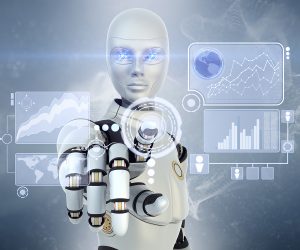 In the sci-fi thriller I, Robot, Will Smith plays a police officer that doesn’t trust robots. His mistrust is rooted in a tragic mistake made by a robot that a human simply wouldn’t make. One could posit that a few years ago, lawyers were expressing similar skepticism about the impact of technology on their profession — I’m sure I’m not the only one who remembers all of the “Robot Lawyer” headlines and speculation of years past. By now, I think many attorneys have a much better idea of what the impacts of technology and innovation actually look like on the practice of law, and it’s not a robot with a tie and briefcase doing their jobs instead of them.
In the sci-fi thriller I, Robot, Will Smith plays a police officer that doesn’t trust robots. His mistrust is rooted in a tragic mistake made by a robot that a human simply wouldn’t make. One could posit that a few years ago, lawyers were expressing similar skepticism about the impact of technology on their profession — I’m sure I’m not the only one who remembers all of the “Robot Lawyer” headlines and speculation of years past. By now, I think many attorneys have a much better idea of what the impacts of technology and innovation actually look like on the practice of law, and it’s not a robot with a tie and briefcase doing their jobs instead of them.
Are robots going to make attorneys obsolete? The short answer is no. A better question: how will intelligent technology continue to evolve the landscape of business? And by extension, how will those technologies continue to evolve the practice of law?
Intelligent Technology — Food Service Example
The fast-food restaurants represent an example of an industry that is likely to change in the coming decade with greater automation, and may most closely approximate the vision of a world where some human functions are replaced by robots. Smartphone apps and kiosks are replacing workers behind the counter in quick-service establishments. There are technologies being developed that can cook a beef patty and make a hamburger, and on the delivery side of the business, Domino’s Pizza recently announced a test of a driverless delivery service in San Antonio. McDonald’s, Taco Bell, and other fast-food restaurants will still employ many people, but the work will likely shift to higher-value tasks, like overseeing restaurant operations and maintaining the intelligent technologies used at stores.
These changes won’t happen overnight, and some of them will certainly be influenced by market dynamics as consumer attitudes and buying power evolve. But as these changes do take place, the value-add of humans will be greater, and the work will likely be more rewarding. Some of these observations can also apply to types of work in other industries that are evolving — including the legal industry.
Intelligent Technology And The Practice Of Law
Robots, artificial intelligence, and other technology will not replace attorneys, but they may remove much of the drudgery and menial tasks, freeing up time so that attorneys can add more value. If you think about it, most legal issues are an exception to a process, out of the ordinary. A sales manager encounters a new situation that is outside the normal negotiating policy and general counsel become involved. Other issues emerge that require further specialization, and outside counsel is consulted. The point is that the core of what attorneys do is manage exceptions that don’t require automation. So if you are an attorney, rest easy and realize that Sonny from I, Robot isn’t out there to take your job.
Here are a few examples of intelligent technologies that are already being applied to the practice of law:
Contract Analytics: How many corporations have tens of thousands of customer contracts, but don’t know what obligations the corporation may have to its customers? The manual review of contracts to search for “Most Favored Nation” clauses might seem impractical when a big deal is being negotiated that might require special discounts. But contract analytics technology can help normalize and extract information across all customer contracts to quickly identify which agreements might create a risk. Attorneys can minimize the manual search and review, and simply focus on the key documents and clauses to advise their sales team on how to close deals with the best outcome possible. Contract analytics solve for many issues like this, including data breach notifications, unorthodox payment terms, hidden liability obligations, or contracts that were written from an old contract template.
Robotic Process Automation: Does your practice have steps in a process that are inherently manual? Do those steps include accessing multiple systems or filings? Is the work process documented and repeatable? Robotic Process Automation (RPA) technologies can be applied to automate that kind of work. Let’s take a trademark practice as an example. RPA can be used to file, monitor, and check the status of trademark filings across a broad portfolio of clients and trademarks. Reports can be automated, alerts can be sent, and automated actions can be triggered based upon a status change. This affords legal professionals the opportunity to focus more time on complex trademark questions.
There are many applications to RPA, and similar approaches could be employed to begin the process of drafting securities filings. Initiating the drafting process, reviewing SEC rule changes, pulling comparables from early filers, and examining potential clauses and language could all be automated.
Document Drafting: Document templates have been used from the early days of document drafting and can apply conditional logic to help draft contracts, filings, and other documents based upon a predetermined set of rules. And technologies that can help find undefined terms or validate citations have been around for a while as well; but there is a whole new breed of technologies that help identify and create a first draft of a legal argument for a brief. Document templates have evolved to include multiple versions of clauses, and there are even systems that leverage crowdsourcing to help identify and determine how language compares to the language in other agreements.
Annual investment in legal technology surpassed $1 billion in 2019. There are hundreds of new legal technology businesses working to innovate and improve the practice of law. If you are an attorney, you may realize that technology can make your work more rewarding, enjoyable, and enable you to be more effective in delivering outcomes to clients.
 Ken Crutchfield is Vice President and General Manager of Legal Markets at Wolters Kluwer Legal & Regulatory U.S., a leading provider of information, business intelligence, regulatory and legal workflow solutions. Ken has more than three decades of experience as a leader in information and software solutions across industries. He can be reached at [email protected].
Ken Crutchfield is Vice President and General Manager of Legal Markets at Wolters Kluwer Legal & Regulatory U.S., a leading provider of information, business intelligence, regulatory and legal workflow solutions. Ken has more than three decades of experience as a leader in information and software solutions across industries. He can be reached at [email protected].